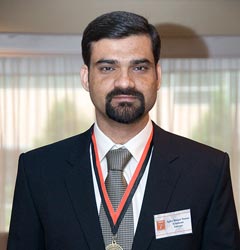Alltech Young Scientist - Final Leg

Agha Waqar Yunus from Austria presents today in the global competition of the Alltech Young Scientist competition. Winners will be announced on Tuesday
The Alltech Young Scientist competition for 2011 is coming to an end! The regional winners are in Kentucky, USA this weekend for the global round of the competition. Each regional winner will present their research papers to an expert panel of judges over the next two days and the winners will be announced at Alltech's Animal Health & Nutrition Symposium on Tuesday.
One of the winners presenting today is Agha Waqar Yunus who is the First place winner of the Graduate Category for Europe. He is a veterinary student from the University of Veterinary Medicine in Vienna, Austria and is presenting his paper on poultry responses to mycotoxins. We asked Agha to tell us about his research and studies.
Q. What did you research?
A. My PhD work was to investigate the response of chicken's intestinal epithelia to some mycotoxins. The paper which I submitted for the Alltech Young Scientist competition explains how a chicken's intestine grows during different stages of exposure to deoxynivalenol. The paper also explained that how the intestinal load of deoxynivalenol is handled in birds which show different deoxynivalenol-induced intestinal lesions.
Q. What inspired you to explore that topic?
A. Chicken is known to be comparatively resistant to some dietary contaminants, especially deoxynivalenol. This fact fascinated me and I wanted to know the underlying mechanisms for this resistance. I therefore focused on the response of the chicken's intestine towards deoxynivalenol and related mycotoxins. The purpose was to have an idea of how the first organ coming into contact with dietary contaminants behaves during acute and chronic exposure. Such data could help understand the puzzle about comparative resistance of chicken towards deoxynivalenol. Another advantage of such studies was reduced stress to experimental animals. It would have been disastrous for the experimental animals if I had used pigs which are known to be very sensitive to deoxynivalenol and other mycotoxins. In my studies, chickens adapted well to dietary deoxynivalenol challenge and I am very happy with that.
Q. How did you become interested in science?
A. Actually animals and ecosystems have always inspired me. During my childhood days, I used to watch insects and amphibians in our garden. I also loved to work with exotic and indigenous poultry species which my father kept for recreational purposes in that garden. Over time I became interested in zoology, particularly species diversity, taxonomy, and animal ecosystems. After secondary school, I opted for zoology as a major and later graduated in Animal Husbandry. This was followed by a Masters in Animal Nutrition. I love animals and want to contribute towards their welfare. But my main driving force is to unveil the unknown, which gives me graet satisfaction.
Q. What would you like to do when you graduate?
A. My studies on the response of a chicken's intestine to dietary mycotoxins genereated many questions. I would certainly try to answer those questions and further explore the intestine of the chicken in relation to mycotoxins. Besides this, I want to document mycotoxin contamination of food and feed in Pakistan. This is important because consumers, farmers, and governments in the Asian region usually overlook the potential mycotoxin hazards. Scientific evidence is crucial for ensuring legislation and control measures against dietary mycotoxin contamination.
Some of the other students presenting this weekend in Kentucky:

From left to right: Geraldo Filgueiras Neto (1st Place Winner Graduate-Latin America), Keliesha Roth (1st Place Winner Undergraduate-North America), Yakov Cepilov (1st Place Winner Undergraduate-Europe), Wai-Fun Leong (1st Place Winner Graduate-Asia Pacific), Prajwal Regmi (1st Place Winner Graduate-North America) and Claudia Maria Casta?eda Benjumea (1st place Winner Undergraduate-Latin America)
All Categories
Archives
- 五月 2014 (6)
- 二月 2014 (1)
- 八月 2013 (1)
- 七月 2013 (1)
- 六月 2013 (4)
- 五月 2013 (17)
- 九月 2012 (1)
- 八月 2012 (22)
- 七月 2012 (1)
- 五月 2012 (24)
- 四月 2012 (2)
- 三月 2012 (12)
- 一月 2012 (7)
- 十二月 2011 (10)
- 十一月 2011 (12)
- 十月 2011 (2)
- 九月 2011 (4)
- 八月 2011 (12)
- 七月 2011 (10)
- 六月 2011 (11)
- 五月 2011 (35)
- 四月 2011 (4)
- 三月 2011 (10)
- 二月 2011 (12)
- 一月 2011 (13)







